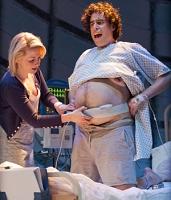Birthday
Ed is in the labour ward about to give birth. That's not Ed as in Edwina, or Edith, or even Edna. No, this Ed is of the Edward variety, i.e. Ed is male. That might require a rather severe and, perhaps, disturbing gear change for some, and indeed that appears to be the writer's intention. But if one is going to examine the nature of childbirth and the complex roles of parents in bringing a new life into the world, a different perspective seems appropriate to study the whole business, and having a male as the child-bearer offers the author the chance to do that.
Ed's wife Lisa (Lisa Dillon) has already been through the experience of childbirth having previously delivered a son. That birth involved complications and procedures which shocked Ed, but that has not stopped him from raiding his wife's ovaries and taking on the job of bearing a child himself. In any case, Lisa has a more lucrative job, and the proposition seems to be as much financially motivated as anything else.
The play takes place wholly in Ed's hospital room and has a cast of just four. Stephen Mangan as Ed sports a balloon-like stomach the size of a small house and has to suffer the ignominy of having his waters broken with an implement - an 'amni-hook' - that looks like it has been resurrected from a medieval torture chamber. Perhaps if he had been shown 'the instruments' before he was impregnated, he might have thought twice!
The impression we get of NHS maternity provision isn't that impressive, at least not until things start to go wrong. Every time Llewella Gideon's droll midwife, Joyce, puts in an appearance she asks Ed if he has been induced as if she has never seen him before. It is the seemingly casual manner of the professional who has 'seen it all'. The doctors are 'busy' - mostly 'writing up their notes' - and thus none of them has time to examine Ed or the baby. But, when things start to go wrong, a surgical team miraculously and suddenly materialises and the system delivers.
Born of the writer's experiences of being present at the birth of his own children, the role reversal here is, on the face of it, a neat idea for a comedy, and the first few minutes show potential. However, once we have passed the amusement of rectal examinations and procedures, the play rapidly runs out of steam and begins to feel like a much longer gestation than the 90 minutes or so it actually is. Largely, this is because there is no clear indication of just what the play is really about, or what point Joe Penhall is making. Furthermore, once we have passed the half-way mark and the baby has been born, it starts to get more 'serious' and meanders into the realms of sentimentality. Perhaps that is unavoidable given the theme, and maybe reflects reality. However, the real problem with this play is that it actually only has one big joke - the idea that a man can give birth. Once that has been milked, there's nowhere else to go, at least in terms of comedy, especially since childbirth is fraught (as in this case) with life-threatening dangers. It might have been funnier if Ed's wife had not already been through the process, but as it is 'Birthday' is only mildly amusing.
"After a tremendous opening, packed with stinging lines, Birthday fades away...Birthday feels sketchy and insubstantial."
Henry Hitchings for The Evening Standard
"Often hilarious and provocative play ...Birthday is full of joys ."
Paul Taylor for Independent
"Stark, stylish and briskly efficient production."
Dominic Cavendish for The Daily Telegraph
External links to full reviews from popular press
Independent - Telegraph -
Originally published on
